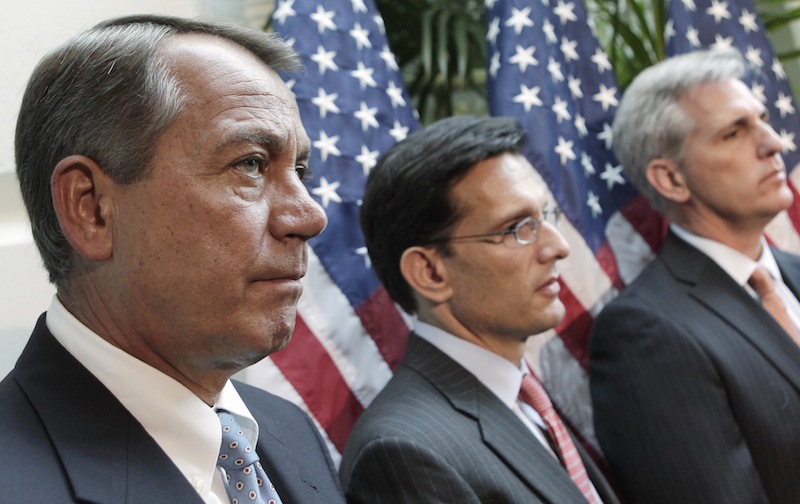While Speaker John Boehner has indicated that he’s privately angling to avoid a catastrophic debt default this month, he’s showing no signs of it in public.
Far from it, the Ohio Republican raised the stakes in dramatic fashion on Sunday, declaring on national television that the U.S. will soon be unable to meet its obligations unless President Barack Obama surrenders and accedes to policy concessions.
“We’re not going to pass a clean debt limit increase,” he said on ABC’s “This Week.” “I told the president, there’s no way we’re going to pass one. … And the president is risking default by not having a conversation with us. … That’s the path we’re on.”
The problem is Obama has emphatically vowed not to negotiate on the debt ceiling, and his aides insist that he will not relent. To the president, it’s not about any particular issue; it’s about the principle of refusing to let the party out of power set national policy by threatening economic sabotage. In other words, he won’t pay a ransom simply to avoid disaster.
“The president’s message is clear: Congress needs to do its job,” Treasury Secretary Jack Lew said Sunday on CNN’s “State of the Union.” “They need to open the government; they need to make us so we can pay our bills. And then we need to negotiate.”
Boehner’s problem is that he’s being overrun by the hardliners in his own party. The Speaker, a longtime congressman with close ties to business, does not want the country to default; he admitted on “This Week” that it would be catastrophic. But he faces the virtually impossible task of bringing most House Republicans on board a debt limit hike that’s agreeable to Democrats, lest his members threaten to topple him.
And so the Speaker is publicly maintaining his hard line, even as his House GOP allies leak to the press that he has told them he’ll avert default with Democratic votes if he has to. The growing rift between his public and private positions will make it harder for him to bridge the two ahead of the Oct. 17 deadline, when the government is estimated to exhaust its borrowing authority. But the White House is prepared to call Boehner’s bluff: if he believes default is so bad, why would he allow it?
If Boehner is to raise the debt ceiling “cleanly” and without concessions in exchange for maintaining current spending levels with Democratic votes, he’s likely to take the House close to the brink, with disaster imminent, in order to justify alienating his conservative members. It’s also possible he’ll to package it with a bill to reopen the shuttered government, another staring contest that Congress is unable to resolve. If he’s destined to step into the line of fire, the theory goes, it’s better to take one bullet than two.
Democrats, most notably Senate Majority Leader Harry Reid (D-NV), are strongly backing Obama’s position that raising the debt ceiling is non-negotiable. They believe Boehner will cave in the end. But they worry the brinkmanship might not only harm the economy, as it did in 2011, but also cause an unintentional breach in the borrowing authority if the bill runs into hurdles in the notoriously sedentary Senate.
Boehner’s Sunday show appearance led to a fresh round of sniping Monday morning, when Reid’s spokesman Adam Jentleson attacked the Speaker’s credibility, pointing out that the Speaker has initially supported the “clean” continuing resolution that the Senate passed, only to renege on it later when his hard-liners balked.
“Speaker Boehner has a credibility problem,” he said in a written statement. “From refusing to let the House vote on a bill that was his idea in the first place, to decrying health-care subsidies for members of Congress and staff that he worked for months to preserve, to stating that the House doesn’t have the votes to pass a clean CR at current spending levels, there is now a consistent pattern of Speaker Boehner saying things that fly in the face of the facts or stand at odds with his past actions. Americans across the country are suffering because Speaker Boehner refuses to come to grips with reality.”
Boehner spokesman Michael Steel fired back at what he called “faux outrage” and dared the Democratic-led Senate to pass a “clean” debt limit increase.
“The federal government is shut down because Democrats refuse to negotiate, and the debt limit is right around the corner. A ‘clean’ debt limit increase can’t pass the Senate, let alone the House,” Steel said. “It’s time for some Washington Democrat to step up, act like an adult, and start talking about how we reopen the government, provide fairness for the American people under ObamaCare, and deal with the drivers of our debt and deficits.”
In response, White House spokesman Josh Earnest observed on Twitter that Congress passed a clean debt limit hike back in January, the last time the deadline was approaching.
.@sahilkapur @michael_steel Both Senate and House passed clean debt limit less than 9 months ago. Why not do it again? #JustVote
— Josh Earnest (@jearnest44) October 7, 2013
A Senate Democratic aide said, “So that means, if the Senate passes a clean debt limit increase, Speaker Boehner will allow a vote on it? I hope their challenge isn’t being hypocritical.”
While Democrats are saying they won’t accept policy concessions, they may be willing to accept symbolic conditions to raising the debt ceiling — a shiny object to help Boehner save face. It’s unclear what those symbolic concessions would be, but based on discussions among aides, it could include instructions to initiate the process of tax reform or hold formal budget negotiations between the House and Senate.
Treasury is set to lose its authority to borrow after Oct. 17, and will instead have to rely on revenues to make its payments. Independent analysts tell the Washington Post that default will come no later than Nov. 1 if Congress doesn’t act.






